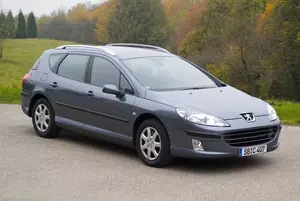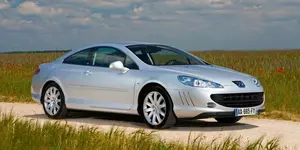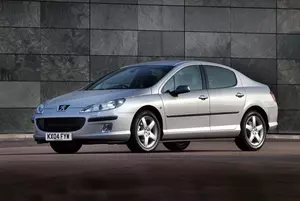
| Vehicle | Curb weight | Difference from world's smallest | Weight to power ratio | 0—60 mph acceleration ratio | Consumption ratio |
|---|---|---|---|---|---|
| 2.2i 16V |
1571 kg / 3464 lbs |
1146 kg (2527 lbs) heavier | 10 kg to 1 hp | 159 kg/s (351 lbs/s) |
175 kg/L (386 lbs/L) |
| 2.0i 16V |
1470 kg / 3241 lbs |
1045 kg (2304 lbs) heavier | 11 kg to 1 hp | 143 kg/s (315 lbs/s) |
177 kg/L (390 lbs/L) |
| 2.2 HDI |
1750 kg / 3859 lbs |
1325 kg (2922 lbs) heavier | 10 kg to 1 hp | 203 kg/s (448 lbs/s) |
282 kg/L (622 lbs/L) |
| 1.6 HDi |
1495 kg / 3296 lbs |
1070 kg (2359 lbs) heavier | 14 kg to 1 hp | 118 kg/s (260 lbs/s) | - |
| 1.8 i 16V |
1455 kg / 3208 lbs |
1030 kg (2271 lbs) heavier | 13 kg to 1 hp | 114 kg/s (251 lbs/s) |
180 kg/L (397 lbs/L) |
| 2.0 HDi |
1648 kg / 3634 lbs |
1223 kg (2697 lbs) heavier | 12 kg to 1 hp | 177 kg/s (390 lbs/s) |
201 kg/L (443 lbs/L) |
| 3.0 i V6 24V |
1640 kg / 3616 lbs |
1215 kg (2679 lbs) heavier | 8 kg to 1 hp | 180 kg/s (397 lbs/s) |
166 kg/L (366 lbs/L) |
| Vehicle | 2.2i 16V |
|---|---|
| Curb weight |
1571 kg / 3464 lbs |
| Difference from world's smallest | 1146 kg (1146 lbs) heavier |
| Weight to power ratio | 10 kg to 1 hp |
| 0—60 mph acceleration ratio | 159 kg/s (351 lbs/s) |
| Consumption ratio |
175 kg/L (386 lbs/L) |
| Vehicle | 2.0i 16V |
| Curb weight |
1470 kg / 3241 lbs |
| Difference from world's smallest | 1045 kg (1045 lbs) heavier |
| Weight to power ratio | 11 kg to 1 hp |
| 0—60 mph acceleration ratio | 143 kg/s (315 lbs/s) |
| Consumption ratio |
177 kg/L (390 lbs/L) |
| Vehicle | 2.2 HDI |
| Curb weight |
1750 kg / 3859 lbs |
| Difference from world's smallest | 1325 kg (1325 lbs) heavier |
| Weight to power ratio | 10 kg to 1 hp |
| 0—60 mph acceleration ratio | 203 kg/s (448 lbs/s) |
| Consumption ratio |
282 kg/L (622 lbs/L) |
| Vehicle | 1.6 HDi |
| Curb weight |
1495 kg / 3296 lbs |
| Difference from world's smallest | 1070 kg (1070 lbs) heavier |
| Weight to power ratio | 14 kg to 1 hp |
| 0—60 mph acceleration ratio | 118 kg/s (260 lbs/s) |
| Consumption ratio | - |
| Vehicle | 1.8 i 16V |
| Curb weight |
1455 kg / 3208 lbs |
| Difference from world's smallest | 1030 kg (1030 lbs) heavier |
| Weight to power ratio | 13 kg to 1 hp |
| 0—60 mph acceleration ratio | 114 kg/s (251 lbs/s) |
| Consumption ratio |
180 kg/L (397 lbs/L) |
| Vehicle | 2.0 HDi |
| Curb weight |
1648 kg / 3634 lbs |
| Difference from world's smallest | 1223 kg (1223 lbs) heavier |
| Weight to power ratio | 12 kg to 1 hp |
| 0—60 mph acceleration ratio | 177 kg/s (390 lbs/s) |
| Consumption ratio |
201 kg/L (443 lbs/L) |
| Vehicle | 3.0 i V6 24V |
| Curb weight |
1640 kg / 3616 lbs |
| Difference from world's smallest | 1215 kg (1215 lbs) heavier |
| Weight to power ratio | 8 kg to 1 hp |
| 0—60 mph acceleration ratio | 180 kg/s (397 lbs/s) |
| Consumption ratio |
166 kg/L (366 lbs/L) |

| Vehicle | Curb weight | Difference from world's smallest | Weight to power ratio | 0—60 mph acceleration ratio | Consumption ratio |
|---|---|---|---|---|---|
| 3.0i V6 24V |
1687 kg / 3720 lbs |
1262 kg (2783 lbs) heavier | 8 kg to 1 hp | 211 kg/s (465 lbs/s) |
198 kg/L (437 lbs/L) |
| 2.2 i 16V |
1600 kg / 3528 lbs |
1175 kg (2591 lbs) heavier | 10 kg to 1 hp | 184 kg/s (406 lbs/s) |
211 kg/L (465 lbs/L) |
| 2.7 V6 24V HDi |
1712 kg / 3775 lbs |
1287 kg (2838 lbs) heavier | 8 kg to 1 hp | 211 kg/s (465 lbs/s) |
241 kg/L (531 lbs/L) |
| Vehicle | 3.0i V6 24V |
|---|---|
| Curb weight |
1687 kg / 3720 lbs |
| Difference from world's smallest | 1262 kg (1262 lbs) heavier |
| Weight to power ratio | 8 kg to 1 hp |
| 0—60 mph acceleration ratio | 211 kg/s (465 lbs/s) |
| Consumption ratio |
198 kg/L (437 lbs/L) |
| Vehicle | 2.2 i 16V |
| Curb weight |
1600 kg / 3528 lbs |
| Difference from world's smallest | 1175 kg (1175 lbs) heavier |
| Weight to power ratio | 10 kg to 1 hp |
| 0—60 mph acceleration ratio | 184 kg/s (406 lbs/s) |
| Consumption ratio |
211 kg/L (465 lbs/L) |
| Vehicle | 2.7 V6 24V HDi |
| Curb weight |
1712 kg / 3775 lbs |
| Difference from world's smallest | 1287 kg (1287 lbs) heavier |
| Weight to power ratio | 8 kg to 1 hp |
| 0—60 mph acceleration ratio | 211 kg/s (465 lbs/s) |
| Consumption ratio |
241 kg/L (531 lbs/L) |

| Vehicle | Curb weight | Difference from world's smallest | Weight to power ratio | 0—60 mph acceleration ratio | Consumption ratio |
|---|---|---|---|---|---|
| 2.0i 16V |
1415 kg / 3120 lbs |
990 kg (2183 lbs) heavier | 10 kg to 1 hp | 144 kg/s (318 lbs/s) |
173 kg/L (381 lbs/L) |
| 2.2i 16V |
1516 kg / 3343 lbs |
1091 kg (2406 lbs) heavier | 9 kg to 1 hp | 158 kg/s (348 lbs/s) |
168 kg/L (370 lbs/L) |
| 2.2 HDI |
1699 kg / 3746 lbs |
1274 kg (2809 lbs) heavier | 10 kg to 1 hp | 205 kg/s (452 lbs/s) |
279 kg/L (615 lbs/L) |
| 2.0 HDi |
1585 kg / 3495 lbs |
1160 kg (2558 lbs) heavier | 12 kg to 1 hp | 160 kg/s (353 lbs/s) |
294 kg/L (648 lbs/L) |
| 1.8 i 16V |
1400 kg / 3087 lbs |
975 kg (2150 lbs) heavier | 12 kg to 1 hp | 114 kg/s (251 lbs/s) |
177 kg/L (390 lbs/L) |
| 1.6 HDi |
1440 kg / 3175 lbs |
1015 kg (2238 lbs) heavier | 13 kg to 1 hp | 116 kg/s (256 lbs/s) | - |
| 3.0 i V6 24V |
1585 kg / 3495 lbs |
1160 kg (2558 lbs) heavier | 8 kg to 1 hp | 182 kg/s (401 lbs/s) |
162 kg/L (357 lbs/L) |
| Vehicle | 2.0i 16V |
|---|---|
| Curb weight |
1415 kg / 3120 lbs |
| Difference from world's smallest | 990 kg (990 lbs) heavier |
| Weight to power ratio | 10 kg to 1 hp |
| 0—60 mph acceleration ratio | 144 kg/s (318 lbs/s) |
| Consumption ratio |
173 kg/L (381 lbs/L) |
| Vehicle | 2.2i 16V |
| Curb weight |
1516 kg / 3343 lbs |
| Difference from world's smallest | 1091 kg (1091 lbs) heavier |
| Weight to power ratio | 9 kg to 1 hp |
| 0—60 mph acceleration ratio | 158 kg/s (348 lbs/s) |
| Consumption ratio |
168 kg/L (370 lbs/L) |
| Vehicle | 2.2 HDI |
| Curb weight |
1699 kg / 3746 lbs |
| Difference from world's smallest | 1274 kg (1274 lbs) heavier |
| Weight to power ratio | 10 kg to 1 hp |
| 0—60 mph acceleration ratio | 205 kg/s (452 lbs/s) |
| Consumption ratio |
279 kg/L (615 lbs/L) |
| Vehicle | 2.0 HDi |
| Curb weight |
1585 kg / 3495 lbs |
| Difference from world's smallest | 1160 kg (1160 lbs) heavier |
| Weight to power ratio | 12 kg to 1 hp |
| 0—60 mph acceleration ratio | 160 kg/s (353 lbs/s) |
| Consumption ratio |
294 kg/L (648 lbs/L) |
| Vehicle | 1.8 i 16V |
| Curb weight |
1400 kg / 3087 lbs |
| Difference from world's smallest | 975 kg (975 lbs) heavier |
| Weight to power ratio | 12 kg to 1 hp |
| 0—60 mph acceleration ratio | 114 kg/s (251 lbs/s) |
| Consumption ratio |
177 kg/L (390 lbs/L) |
| Vehicle | 1.6 HDi |
| Curb weight |
1440 kg / 3175 lbs |
| Difference from world's smallest | 1015 kg (1015 lbs) heavier |
| Weight to power ratio | 13 kg to 1 hp |
| 0—60 mph acceleration ratio | 116 kg/s (256 lbs/s) |
| Consumption ratio | - |
| Vehicle | 3.0 i V6 24V |
| Curb weight |
1585 kg / 3495 lbs |
| Difference from world's smallest | 1160 kg (1160 lbs) heavier |
| Weight to power ratio | 8 kg to 1 hp |
| 0—60 mph acceleration ratio | 182 kg/s (401 lbs/s) |
| Consumption ratio |
162 kg/L (357 lbs/L) |